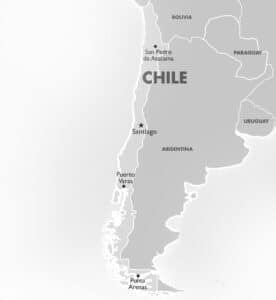Market Spotlight: Chile



-
Chile is ranked 72.6/100 on the ease of doing business ranking, according to Statista, and ranked #1 on doing business across Latin America.
-
This market has open market policies, zero tariffs, solid business practices, and low corruption making Chile a robust global trading partner and a favorable export market.
-
Chile is a regional leader in LATAM, boasting economic and political stability, transparency, and strong democratic institutions.
-
In March 2022, Chile elected President Gabriel Boric who seeks to reform taxes to provide additional social programs and change business rules and regulations such as mining, energy, water, healthcare, and financial services.

-
Be sure to make appointments far in advance, reconfirming the meetings shortly before. Initial meetings are focused on relationship-building rather than decision-making. Be prepared for decisions to be made following multiple meetings.
-
Chilean punctuality is not as stressed as in other parts of the world. Showing up 30 minutes late is not unusual.
-
When you arrive in a business or casual setting, greet the most senior person first before introducing yourself to others. Exchanging business cards and contact information at the beginning of your first meeting is customary.
-
Do not be overbearing by using hard-sell tactics and pressure, however, be straightforward and direct in your negotiations.

-
Chile is an open economy with relatively low tariffs across the board and business regulations similar to the United States and Western Europe.
-
Chile continues to receive FDI due to its open trade policies and regulations. Foreign investments have been in high-value innovative projects such as 5G technology and applications, data analytics, public transportation platforms, smart grid technologies, and renewable energy specifically green hydrogen.
-
Chile has 31 trade agreements that span 65 economies, which encompass 88% of the world’s GDP. Within these agreements, there are 17 free trade agreements with countries like the United States, China, the European Free Trade Association, Argentina, and much of southeast Asia.
-
Chile is a founding member of the Comprehensive and Progressive Agreement for Trans-Pacific Partnership (CPTPP) which has gained attention from countries such as China, the United States, and the United Kingdom.

-
Chile’s economic freedom score is 74.4, making its economy the 20th freest out of 177 economies. Chile ranks high above the world average and its LATAM neighbors.
-
Chile, like others, continues to experience economic shocks due to the COVID-19 pandemic and energy price increases due to the Russian-Ukrainian crisis. This has led to a sharp increase in inflation with analysts’ expectations of slow growth in 2023.
-
With the newly elected President Boric’s proposed tax reforms and expansion of social programs, along with other geopolitical tensions across LATAM, investors are apprehensive about an expanded government role in the economy and are diversifying assets abroad.
-
Chile has a strong economy despite economic uncertainty. It pursues market-oriented strategies, increase global commercial ties, and is an active player in international issues and hemispheric free trade.

-
The Chilean population has moderate English proficiency, ranking 45 out of 111 countries globally, and 6 of 20 LATAM countries, according to the Education First English Proficiency Index.
-
The primary language spoken in Chile is Spanish, though much of the population is somewhat proficient. However, foreign executives should be prepared with Spanish-translated business materials and have an interpreter nearby.
-
English proficiency continues to become more prevalent due to globalization, the diversification of the Chilean economy, and government policies in education to expand English education in schools.

-
Chile has a labor force participation rate of 59.8%, as of October 2022, compared to the global average of 59%. In recent years since the pandemic, the labor force has been decreasing.
-
Compared to other OECD countries, Chile has relatively low labor costs, while skill levels in labor are relatively high compared to their regional counterparts.
-
The minimum wage in Chile is CLP410,000 per month (USD $515 per month). The hourly minimum wage is equivalent to USD $2.86/hour.


